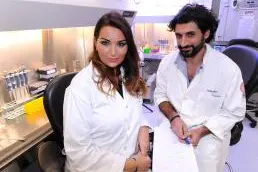PHOTO
Doha - January 14, 2015: Cancer researchers at Weill Cornell Medical College in Qatar (WCMC-Q) have made a breakthrough that could lead to improved treatments for one of the deadliest forms of the disease.
Across Qatar, the Middle East and the wider world, tens of thousands of women die from ovarian cancer each year meaning any improvement in the therapies used could be of huge significance.
Now Dr. Bella Guerrouahen, a postdoctoral associate in genetic medicine at WCMC-Q, has discovered one of the aspects of how and why a patient may build up resistance to the popular cancer drug bevacizumab, which is sold commercially as Avastin.
The job of Avastin is to prevent the growth of blood vessels to the tumor, thereby cutting off its food and oxygen supply. It does this by targeting VEGF (vascular endothelial growth factor) - a protein that stimulates the growth of brand new blood vessels (termed vasculogenesis), and also the creation of new blood vessels from existing ones (angiogenesis). The VEGF itself is produced by the cancer cells - and the VEGF then attracts the endothelial cells which form new blood vessels around the tumor.
But despite initial success where the Avastin works and prevents the growth of new blood vessels- so inhibiting the tumor - patients often suffer from a build-up of resistance to the Avastin whereby the blood vessels begin growing again. In turn this allows the tumor to thrive and potentially spread.
Working in the research laboratory of Dr. Arash Rafii, Associate Professor of Genetic Medicine in Obstetrics and Gynecology at WCMC-Q and an expert in stem cell science and gynecologic oncology, Dr. Guerrouahen explored the reasons behind the phenomenon.
With funding from Qatar National Research Fund under the Junior Scientists Research Experience program, and support from Dr. Ahmed Saleh from the pharmacy at Qatar's National Centre for Cancer Care and Research (NCCCR), she and her research team discovered that it was the endothelial cells - cells that line the walls of blood vessels - that were essentially building up a resistance to Avastin. Because the VEGF was being neutralized by Avastin, the cancer cells instead produced more FGF (fibroblast growth factor), another protein involved in the creation of blood vessels. This allowed the production of new blood vessels to re-start and eventually for the tumor to carry on growing.
Dr. Guerrouahen said: "This research demonstrates the innovation of the work we are conducting and is at the fore-front of cancer research. We are now not just looking at the resistance of cancer cells but also the wider microenvironment of the tumor, in this case the resistance mediated by the endothelium.
"What my paper showed was that patients would benefit from a combination of therapies - when you use an anti-FGF in tandem with Avastin you get better results. This could apply to other cancers as well.
"With this kind of study we are looking for optimizing treatments for these diseases. It also explains the mechanism, how it works and how we can improve treatment. It can help to build new translational research as combination therapies can be studied in trials."
Dr. Rafii said that Dr. Guerrouahen had a very original approach to resistance, looking at the mocroenvironment rather than cancer cells. Her research opens new avenues in how we perceive tumor microenvironment and we might soon develop new therapeutic strategies targeting the dialogue between the tumor and endothelial cells.
He added: "The success of this research relied on strong collaboration between WCMC-Q and Hamad Medical Corporation."
Dr. Guerrouahen's research can be read in full at www.ncbi.nlm.nih.gov/pubmed/25319392. It was funded by Qatar National Research Fund under its National Priorities Research Program award number: 09-1174-3-291, 4-640-1-096, 6-1131-3-268 (A. Rafii) and JSREP No: 4-013-3-005 (B.S. Guerrouahen).
About Weill Cornell Medical College in Qatar
Weill Cornell Medical College in Qatar is a partnership between Cornell University and Qatar Foundation. It offers pre-medical and medical courses leading to the Cornell University M.D. degree with teaching by Cornell and Weill Cornell faculty and by physicians at Hamad Medical Corporation (HMC) and Aspetar Orthopedic and Sports Medicine Hospital who hold Weill Cornell appointments. Through its biomedical research program, WCMC-Q is building a sustainable research community in Qatar while advancing basic science and clinical research. Through its medical college, WCMC-Q seeks to provide the finest education possible for medical students, to improve health care both now and for future generations, and to provide high quality health care to the Qatari population.
For more info, please contact:
Hanan Lakkis
Media Relations Manager
Weill Cornell Medical College in Qatar
Mobile: +974 55536564
Direct Line: +974 44928661
hyl2004@qatar-med.cornell.edu
© Press Release 2015




















